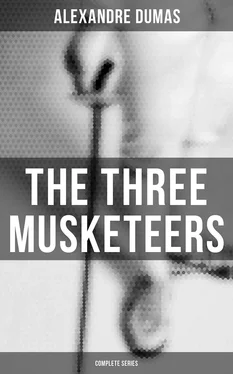“Oh! oh!” he said, “I fancied this castle belonged to the ancient branch of Orleans. Can Porthos have negotiated for it with the Duc de Longueville?”
“Faith!” exclaimed Planchet, “here’s land in good condition; if it belongs to Monsieur Porthos I wish him joy.”
“Zounds!” cried D’Artagnan, “don’t call him Porthos, nor even Vallon; call him De Bracieux or De Pierrefonds; thou wilt knell out damnation to my mission otherwise.”
As he approached the castle which had first attracted his eye, D’Artagnan was convinced that it could not be there that his friend dwelt; the towers, though solid and as if built yesterday, were open and broken. One might have fancied that some giant had cleaved them with blows from a hatchet.
On arriving at the extremity of the castle D’Artagnan found himself overlooking a beautiful valley, in which, at the foot of a charming little lake, stood several scattered houses, which, humble in their aspect, and covered, some with tiles, others with thatch, seemed to acknowledge as their sovereign lord a pretty chateau, built about the beginning of the reign of Henry IV., and surmounted by four stately, gilded weather-cocks. D’Artagnan no longer doubted that this was Porthos’s pleasant dwelling place.
The road led straight up to the chateau which, compared to its ancestor on the hill, was exactly what a fop of the coterie of the Duc d’Enghein would have been beside a knight in steel armor in the time of Charles VII. D’Artagnan spurred his horse on and pursued his road, followed by Planchet at the same pace.
In ten minutes D’Artagnan reached the end of an alley regularly planted with fine poplars and terminating in an iron gate, the points and crossed bars of which were gilt. In the midst of this avenue was a nobleman, dressed in green and with as much gilding about him as the iron gate, riding on a tall horse. On his right hand and his left were two footmen, with the seams of their dresses laced. A considerable number of clowns were assembled and rendered homage to their lord.
“Ah!” said D’Artagnan to himself, “can this be the Seigneur du Vallon de Bracieux de Pierrefonds? Well-a-day! how he has shrunk since he gave up the name of Porthos!”
“This cannot be Monsieur Porthos,” observed Planchet replying, as it were, to his master’s thoughts. “Monsieur Porthos was six feet high; this man is scarcely five.”
“Nevertheless,” said D’Artagnan, “the people are bowing very low to this person.”
As he spoke, he rode toward the tall horse—to the man of importance and his valets. As he approached he seemed to recognize the features of this individual.
“Jesu!” cried Planchet, “can it be?”
At this exclamation the man on horseback turned slowly and with a lofty air, and the two travelers could see, displayed in all their brilliancy, the large eyes, the vermilion visage, and the eloquent smile of—Mousqueton.
It was indeed Mousqueton—Mousqueton, as fat as a pig, rolling about with rude health, puffed out with good living, who, recognizing D’Artagnan and acting very differently from the hypocrite Bazin, slipped off his horse and approached the officer with his hat off, so that the homage of the assembled crowd was turned toward this new sun, which eclipsed the former luminary.
“Monsieur d’Artagnan! Monsieur d’Artagnan!” cried Mousqueton, his fat cheeks swelling out and his whole frame perspiring with joy; “Monsieur d’Artagnan! oh! what joy for my lord and master, Du Vallon de Bracieux de Pierrefonds!”
“Thou good Mousqueton! where is thy master?”
“You stand upon his property!”
“But how handsome thou art—how fat! thou hast prospered and grown stout!” and D’Artagnan could not restrain his astonishment at the change good fortune had produced on the once famished one.
“Hey, yes, thank God, I am pretty well,” said Mousqueton.
“But hast thou nothing to say to thy friend Planchet?”
“How, my friend Planchet? Planchet—art thou there?” cried Mousqueton, with open arms and eyes full of tears.
“My very self,” replied Planchet; “but I wanted first to see if thou wert grown proud.”
“Proud toward an old friend? never, Planchet! thou wouldst not have thought so hadst thou known Mousqueton well.”
“So far so well,” answered Planchet, alighting, and extending his arms to Mousqueton, the two servants embraced with an emotion which touched those who were present and made them suppose that Planchet was a great lord in disguise, so highly did they estimate the position of Mousqueton.
“And now, sir,” resumed Mousqueton, when he had rid himself of Planchet, who had in vain tried to clasp his hands behind his friend’s fat back, “now, sir, allow me to leave you, for I could not permit my master to hear of your arrival from any but myself; he would never forgive me for not having preceded you.”
“This dear friend,” said D’Artagnan, carefully avoiding to utter either the former name borne by Porthos or his new one, “then he has not forgotten me?”
“Forgotten—he!” cried Mousqueton; “there’s not a day, sir, that we don’t expect to hear that you were made marshal either instead of Monsieur de Gassion, or of Monsieur de Bassompierre.”
On D’Artagnan’s lips there played one of those rare and melancholy smiles which seemed to emanate from the depth of his soul—the last trace of youth and happiness that had survived life’s disillusions.
“And you—fellows,” resumed Mousqueton, “stay near Monsieur le Comte d’Artagnan and pay him every attention in your power whilst I go to prepare my lord for his visit.”
And mounting his horse Mousqueton rode off down the avenue on the grass at a hand gallop.
“Ah, there! there’s something promising,” said D’Artagnan. “No mysteries, no cloak to hide one’s self in, no cunning policy here; people laugh outright, they weep for joy here. I see nothing but faces a yard broad; in short, it seems to me that nature herself wears a holiday garb, and that the trees, instead of leaves and flowers, are covered with red and green ribbons as on gala days.”
“As for me,” said Planchet, “I seem to smell, from this place, even, a most delectable perfume of fine roast meat, and to see the scullions in a row by the hedge, hailing our approach. Ah! sir, what a cook must Monsieur Pierrefonds have, when he was so fond of eating and drinking, even whilst he was only called Monsieur Porthos!”
“Say no more!” cried D’Artagnan. “If the reality corresponds with appearances I am lost; for a man so well off will never change his happy condition, and I shall fail with him, as I have already done with Aramis.”
Chapter 11
How D’Artagnan, in discovering the Retreat of Porthos, perceives that Wealth does not necessarily produce Happiness.
Table of Contents
D’Artagnan passed through the iron gate and arrived in front of the chateau. He alighted as he saw a species of giant on the steps. Let us do justice to D’Artagnan. Independently of every selfish wish, his heart palpitated with joy when he saw that tall form and martial demeanor, which recalled to him a good and brave man.
He ran to Porthos and threw himself into his arms; the whole body of servants, arranged in a semi-circle at a respectful distance, looked on with humble curiosity. Mousqueton, at the head of them, wiped his eyes. Porthos linked his arm in that of his friend.
“Ah! how delightful to see you again, dear friend!” he cried, in a voice which was now changed from a baritone into a bass, “you’ve not then forgotten me?”
“Forget you! oh! dear Du Vallon, does one forget the happiest days of flowery youth, one’s dearest friends, the dangers we have dared together? On the contrary, there is not an hour we have passed together that is not present to my memory.”
Читать дальше












